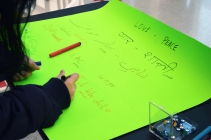“Amar Bhaiyer Rôkte Rangano Ekushe Februari, Ami Ki Bhulite Pari,” sang the 10 Bangladesh Student Association members. The verse translates to, “Can I forget the 21st of February, incarnadined by the love of my brother?” Not many people are familiar with this Bengali song, or the meaning of it. But for those who are, it is a poignant reminder of the importance of cultural diversity, especially that of language.
On Feb. 26, the BSA, lead by their president Tahmid Abtahiah, a masters’ student in Computer Engineering, hosted International Mother Language Day in the Commons for the first time ever. “In brief, International Mother Language Day is being celebrated across the world with hope of preserving languages and promote cultural and linguistic diversity. This day is also a great scope to celebrate multilingualism and cultural tolerance.”
The celebration was especially personal for the members of the BSA. “The date [International Mother Language Day] corresponds to Feb. 21, 1952,” said Abtahiah. “Students from the University of Dhaka, Jagannath University and Dhaka Medical College demonstrated for the recognition of Bengali as one of the two national languages of East Pakistan, were shot dead by police near the Dhaka High Court in the capital of present-day Bangladesh.”

This event was preceded by the creation of the Shaheed Minar, an effigy in honor of the brave students who sacrificed their lives on Feb. 21 for their mother tongue. The BSA built a replica of the Shaheed Minar, and displayed it in the Commons. Later in the day, the official celebration was held in the Gameroom.
The evening portion of the event mostly consisted of Bengali, Panjabi, Kannada and Persian songs and poetry. Dr. Renée Lambert-Bretiere, Ph.D. in Linguistics and assistant professor at UMBC, gave a brief presentation on endangered languages, why and how they become endangered and why they matter.
What she had to say tied in very well to the historical event that is commemorated on Feb. 21, and the idea that people have sacrificed themselves in order to preserve their heritage. “Languages are disappearing at an alarming rate. As communities lose their languages, they often also lose parts of their cultural traditions such as the songs, myths and poetry that cannot be easily transferred to another language,” said Lambert-Bretiere.
“This is a phenomenon that is happening in all parts of the world. Even languages that have millions of speakers can disappear over time due to urbanization and globalization. Linguists, like myself, are active in the preservation and maintenance of that linguistic diversity,” said Lambert-Bretiere.
Here at UMBC, there are many opportunities to dive into different cultures and experience their arts, their experiences and their languages, which makes a celebration such as this that much more important. As Lambert-Bretiere remarked, “The human language is so ubiquitous that it permeates all aspects of life. Each language is a complex system of knowledge and abilities. We use language to express any thoughts and emotions, and to understand the world around us. Language is an expression of who we are as individuals, communities, and nations.”